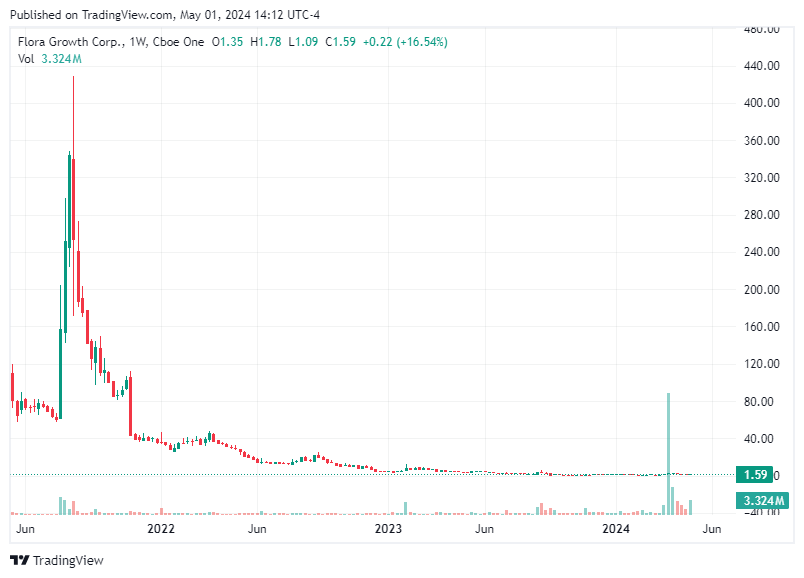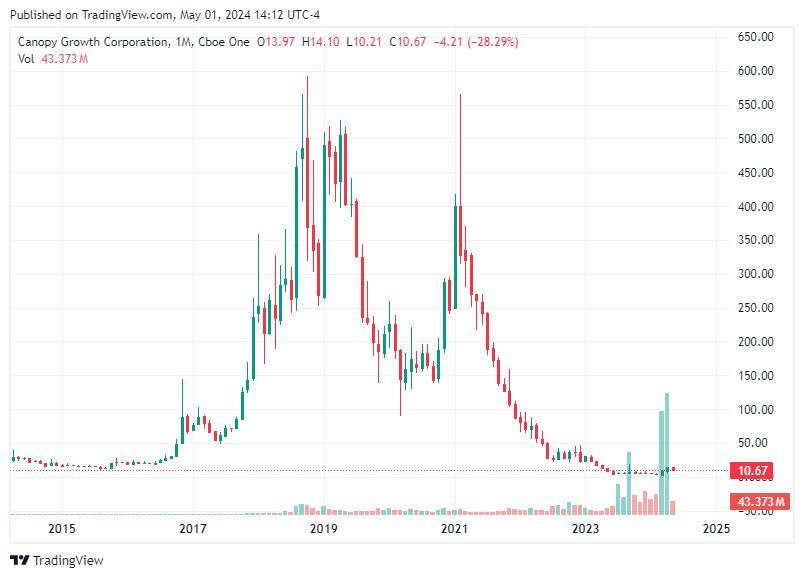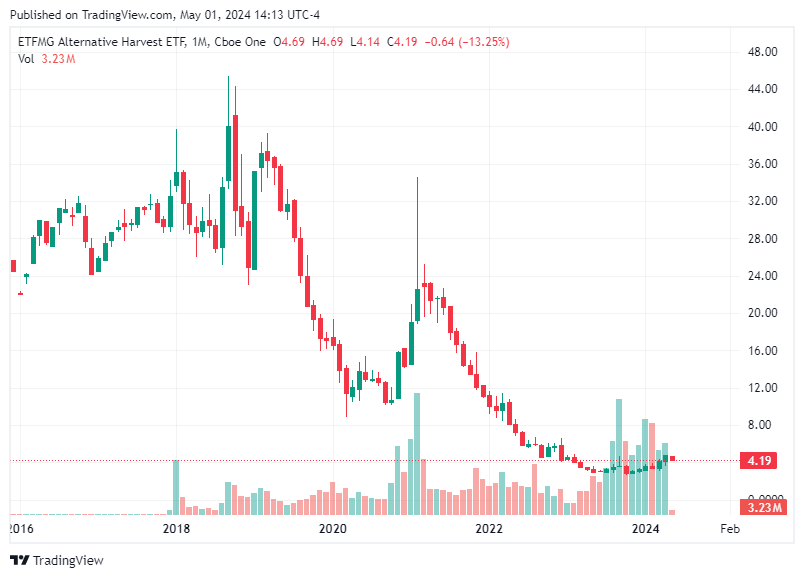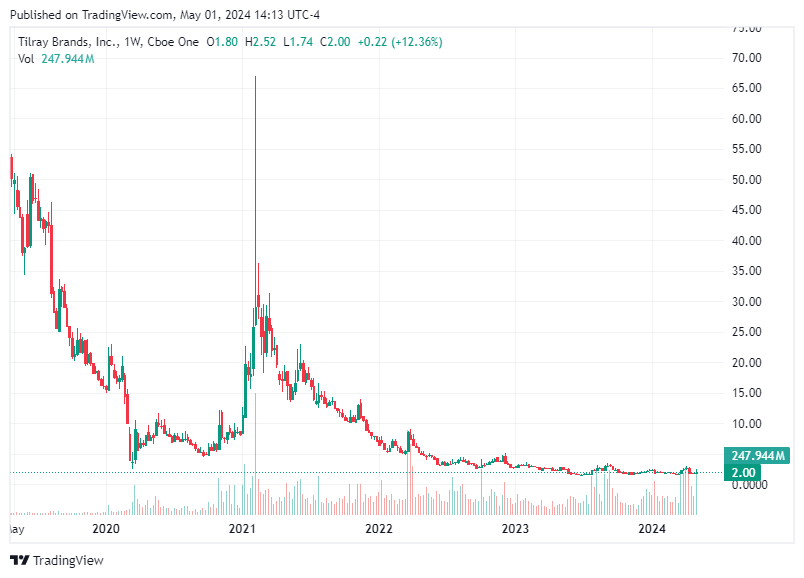Cannabis Stocks Soar: DEA Reclassifies Cannabis As Schedule III Drug
Why you need to watch for in cannabis stocks like IIPR, MSOS, MJ, CGC, FLGC, AKAN, and IMCC.

The United States is on the brink of a monumental shift in its policy towards marijuana, a change that could redefine the nation’s stance on one of its most debated substances. The Drug Enforcement Administration (DEA) has put forward a proposal to reclassify marijuana as a less harmful drug, a move that has energized the cannabis industry and sparked significant activity in the stocks of companies involved in this sector. This long-overdue policy shift recognizes the medical uses of cannabis and its lower potential for abuse compared to some of the nation's most dangerous drugs. But what does this mean for the future of cannabis in the U.S., and how does it affect the legal, economic, and social landscape?
The DEA's announcement signals a significant departure from longstanding federal policy. Moving marijuana from a Schedule I to a Schedule III classification under the Controlled Substances Act would align federal policy more closely with the current scientific understanding and societal acceptance of cannabis. Schedule I drugs are categorized as substances with no currently accepted medical use and a high potential for abuse. In stark contrast, Schedule III substances are considered to have less potential for abuse and some accepted medical use. This reclassification would not legalize marijuana for recreational use at the federal level but would acknowledge the therapeutic benefits of cannabis, potentially unlocking new research opportunities and reducing the regulatory burdens associated with its study and medicinal application. The news of the DEA's proposed reclassification has already made waves in the financial markets, particularly among cannabis-related stocks. Companies like AdvisorShares Pure US Cannabis ETF ($MSOS), ETFMG Alternative Harvest ETF ($MJ), Canopy Growth Corporation ($CGC), Flora Growth Corp. ($FLGC), Akanda Corp. ($AKAN), and IM Cannabis Corp. ($IMCC) have seen increases in trading volume, as investors anticipate the positive implications of the DEA's proposal. These companies, ranging from ETFs that track the performance of the cannabis industry to firms specializing in the cultivation, production, and sale of cannabis products, stand to benefit from a regulatory environment that is more conducive to business growth and expansion. A reclassification could lead to increased investment in cannabis research, broader acceptance of medical marijuana across states, and potentially open up new markets for these companies.

Legal and Economic Implications
Legally, the DEA's move could simplify the complex regulatory landscape that has hampered the cannabis industry. By recognizing the medical utility of marijuana, the federal government would be removing one of the significant barriers to banking, insurance, and other financial services that have been reluctant to engage with cannabis businesses due to the plant's Schedule I status. This could, in turn, spur growth, create jobs, and generate substantial tax revenue for states.
Economically, the reclassification of marijuana would likely propel the already booming cannabis industry to new heights. With barriers to entry lowered, we could see an influx of start-ups and traditional companies entering the space, leading to innovation in product development, cultivation techniques, and consumer technology. This evolution would not only enhance competition within the industry but also improve product quality and variety for consumers. From a social standpoint, the DEA's proposal acknowledges the changing public perception towards cannabis, which has increasingly been viewed as a substance with genuine medicinal benefits rather than a dangerous drug. This shift could play a crucial role in destigmatizing the use of cannabis, especially among patients who rely on medical marijuana for treatment. Health-wise, reclassifying marijuana as a Schedule III drug would open new avenues for scientific research into its efficacy and safety as a medical treatment. Currently, restrictions on cannabis research have limited our understanding of its full potential and therapeutic applications. Easing these restrictions could lead to breakthroughs in treating conditions such as chronic pain, epilepsy, and multiple sclerosis, among others.

Challenges and Considerations
Despite the optimistic outlook, the road ahead is not without its challenges. The DEA's proposal must first clear several bureaucratic hurdles, including a review by the White House Office of Management and Budget, a public comment period, and further evaluation by an administrative judge. Additionally, the move has raised concerns among those wary of increasing the accessibility of marijuana, citing potential risks to public health and safety. The DEA's reclassification would have significant implications for medical marijuana users and state medical programs, it would do little to affect state recreational marijuana programs directly. The complex patchwork of state laws regarding recreational use would remain, underscoring the need for comprehensive federal legislation to address the legal status of cannabis fully.
The DEA's proposed reclassification of marijuana represents a pivotal moment in the country's relationship with cannabis. It reflects a broader acknowledgment of the substance's medical benefits and its changing role in American society. For the cannabis industry and related financial markets, this shift promises new opportunities for growth and innovation. Realizing the full potential of this change requires navigating the accompanying legal, economic, and social challenges. As the public comment period and subsequent reviews unfold, all eyes will be on the DEA and the broader ramifications of its historic policy change.
The news that the DEA is moving to reclassify marijuana as a less dangerous drug could have significant implications for the cannabis industry over the next five years. This decision signals a shift in regulatory attitudes towards cannabis and could lead to a series of cascading effects on both the market and legislative fronts. Here’s how it could impact the industry and what investors should watch for in cannabis stocks like IIPR, MSOS, MJ, CGC, FLGC, AKAN, and IMCC.

Market Expansion and Legalization Momentum
Increased Legalization Efforts: A reclassification by the DEA could accelerate legalization efforts at both state and federal levels in the United States, potentially opening up new markets for cannabis companies. This could lead to an increased consumer base and more significant sales volumes.
Banking and Financial Services: One of the most immediate impacts could be on banking and financial services for cannabis businesses. Currently, many banks are hesitant to serve cannabis companies due to federal restrictions. Reclassification may ease these restrictions, making it easier for cannabis companies to access banking services, loans, and investment.
Medical Research and Development: With reclassification, there could be a substantial increase in medical research around cannabis, leading to new product developments and patents, particularly in areas like pain management, mental health, and chronic illnesses. Companies investing in R&D could see long-term benefits from this.

Investment Landscape Shift
Stock Volatility: In the short term, expect volatility in cannabis stocks as the market reacts to the news and anticipates changes in the regulatory landscape. This could present buying opportunities for investors who are bullish on the sector's long-term prospects.
Mergers and Acquisitions: The industry might see an uptick in mergers, acquisitions, and partnerships as companies seek to capitalize on expanded market opportunities. Larger players may look to consolidate their market presence or expand into new areas, potentially impacting stock valuations.
International Implications: The DEA's move could also influence cannabis policies in other countries, potentially opening up international markets. Companies with a global footprint or ambitions could stand to benefit significantly.

What Investors Should Look Out For:
Regulatory Updates: Keep an eye on further federal and state legislative developments following the DEA’s reclassification. Changes in laws, especially regarding medical and recreational use, will be critical.
Financial Performance Indicators: Watch for improvements in the financials of cannabis companies, such as revenue growth, profitability, and cash flow, as a sign that they are capitalizing on the changing landscape.
Strategic Moves: Pay attention to strategic partnerships, expansions, and product launches that could indicate how companies are positioning themselves for growth in a less restrictive regulatory environment.
Market Sentiment: Investor sentiment towards cannabis stocks will be important. Positive momentum could lead to increased investment in the sector, pushing up stock prices.
The DEA’s decision has the potential to significantly transform the cannabis industry, investors should remain vigilant, considering both the opportunities and risks inherent in a rapidly changing regulatory and business environment. Keeping an eye on legislative developments, company strategies, and market dynamics will be crucial in navigating this evolving landscape.


